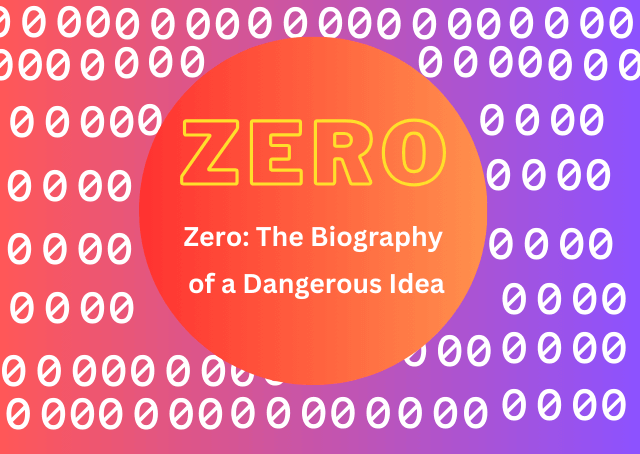5 Zero: Summary of zero, the biography of a dangerous idea

5 Zero: Summary of zero, the biography of a dangerous idea
Imagine a world without zero, a place where the very concept of nothingness was nonexistent. This enigmatic numeral, born from the depths of human curiosity and ingenuity, has a profound story to tell. In the pages of “Zero: The Biography of a Dangerous Idea,” Charles Seife takes us on a captivating journey through the history, impact, and significance of zero, a digit that changed the course of human civilization. This article aims to delve deep into the book’s narrative, exploring the birth of zero, its evolution, and its far-reaching implications across mathematics, science, philosophy, literature, and art.
Table of Contents
1. The Birth of Zero
In the annals of human mathematical history, the birth of zero stands as a momentous event. This was an era when ancient civilizations, such as the Egyptians and Romans, had no symbol or concept for zero. It might seem perplexing in our modern context, but imagine trying to perform advanced mathematical calculations without the numeral that signifies nothingness.
Zero, as we understand it today, was a radical and revolutionary idea, one that was cultivated in the fertile intellectual soil of ancient India. Around the 6th century AD, Indian mathematicians recognized a pressing need for a placeholder, a symbol to denote the absence of quantity. They ingeniously conceived zero, giving it both a symbol and a purpose. This groundbreaking innovation not only facilitated arithmetic but also laid the groundwork for advanced mathematical concepts that would emerge in the centuries to come.
2. Zero in the Islamic Golden Age
Zero’s journey did not stop with its conception in India; it continued to evolve during the Islamic Golden Age. The transfer of Indian numerals to the Islamic world proved to be a turning point in the history of zero.
Remarkably, Islamic scholars, particularly Al-Khwarizmi, not only embraced zero but also played a pivotal role in translating and further developing Indian numerical concepts. Al-Khwarizmi’s work was instrumental in the development of algebra and algorithms, and both of these fields heavily relied on the concept of zero. Algorithms, in particular, have become the bedrock of modern computing, underscoring the enduring relevance of zero in our technologically driven world.
3. Zero in the Middle Ages and Renaissance
Transitioning zero into the European mathematical lexicon was not a seamless process. Europe, initially hesitant to embrace this novel numeral, needed a champion to usher in this mathematical revolution.
Enter Fibonacci, an Italian mathematician in the 13th century, who introduced zero to Europe through his groundbreaking book, “Liber Abaci.” Fibonacci’s work was not only instrumental in promoting zero but also in popularizing the Hindu-Arabic numeral system, which we use today. As Europe adopted zero, it became a catalyst for change during the Renaissance and the Scientific Revolution, unlocking new possibilities in mathematics and science.
4. Zero in Philosophy and Metaphysics
Beyond its mathematical and scientific significance, zero’s influence extends into the realms of philosophy and metaphysics. It challenges fundamental notions of existence and nothingness.
Paradoxically, zero, which represents nothingness, has been the subject of deep philosophical contemplation. Eastern philosophies, such as Buddhism, have long pondered the concept of emptiness, which shares intriguing parallels with zero. The idea that zero can represent both absence and infinity raises profound questions about the nature of reality, existence, and the void.
5. Zero in Literature and Art
Zero is not confined to the realm of numbers and equations; it has inspired creativity and symbolism in the world of literature and art.
Surprisingly, zero serves as a symbol and metaphor in literature, representing emptiness, absence, or a blank canvas for imagination. In visual arts, artists have employed zero’s symbolism to convey concepts of infinity, emptiness, and the unknown. From the minimalist art movement to the surrealism of Salvador Dalí, Zero’s cultural and symbolic significance is vividly portrayed in creative expressions.
6. Controversies and Misconceptions
The journey of zero has not been without its share of challenges and misconceptions.
Interestingly, zero’s abstract nature has led to misconceptions, with some viewing it as mere “nothing.” This perception belies the profound role zero plays in mathematics and science. Its introduction brought about fundamental changes in how we perceive and manipulate numbers, challenging conventional wisdom and leading to mathematical mysteries and paradoxes that continue to baffle and inspire mathematicians. Best 10 Bio Link
7. The Everlasting Legacy of Zero
As we reflect on Zero’s journey from a revolutionary concept in ancient India to an indispensable part of our modern world, it becomes clear that its legacy is everlasting.
In retrospect, zero is not just a number, but a powerful idea that transformed the way we understand and interact with the universe. Its influence permeates every facet of our lives, from the devices we use to the philosophical questions we ponder. Zero’s legacy is a testament to the enduring power of human ingenuity and curiosity.
FAQ
Why is zero called a “dangerous idea”?
The term “dangerous idea” in the book’s title refers to the transformative and disruptive nature of zero. Zero challenged established mathematical and philosophical notions, leading to significant advancements and even controversy.
How did zero impact the digital revolution?
Zero serves as the foundation for the binary system used in computing. Computers rely on the binary code, which consists of just two digits, 0 and 1, to represent and process all information.
Is zero truly a number?
Yes, zero is considered a number in mathematics. It represents the absence of quantity and holds a crucial place in numerical systems and calculations.
Are there any unsolved mysteries related to zero?
Yes, there are several unsolved problems and paradoxes related to zero in mathematics, such as Zeno’s paradoxes and the Riemann Hypothesis, which continue to challenge mathematicians.
In conclusion, the biography of Zero is a testament to the profound impact that seemingly simple ideas can have on the course of human history and knowledge. Zero, born from the depths of human curiosity and innovation, continues to shape our world in ways both expected and unexpected. Its journey, from conception to controversy to cultural significance, serves as a captivating narrative of human intellect and creativity.



